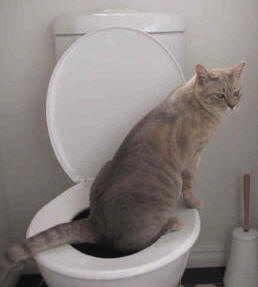Reasons You Must Never Flush Cat Poop Down Your Toilet - Important Facts
Reasons You Must Never Flush Cat Poop Down Your Toilet - Important Facts
Blog Article
Are you looking for details about Don’t flush cat feces down the toilet?

Introduction
As feline proprietors, it's essential to be mindful of exactly how we dispose of our feline pals' waste. While it may seem practical to purge feline poop down the bathroom, this method can have damaging repercussions for both the atmosphere and human health and wellness.
Alternatives to Flushing
Thankfully, there are much safer and more responsible means to take care of feline poop. Think about the following choices:
1. Scoop and Dispose in Trash
One of the most usual technique of dealing with pet cat poop is to scoop it into a naturally degradable bag and throw it in the garbage. Make sure to make use of a dedicated trash inside story and deal with the waste immediately.
2. Use Biodegradable Litter
Go with biodegradable feline trash made from products such as corn or wheat. These litters are environmentally friendly and can be safely dealt with in the garbage.
3. Hide in the Yard
If you have a backyard, consider hiding pet cat waste in an assigned area far from vegetable gardens and water sources. Make certain to dig deep enough to prevent contamination of groundwater.
4. Install a Pet Waste Disposal System
Buy an animal waste disposal system particularly developed for feline waste. These systems use enzymes to break down the waste, minimizing smell and environmental effect.
Health and wellness Risks
In addition to environmental problems, flushing pet cat waste can additionally position wellness dangers to people. Feline feces might include Toxoplasma gondii, a bloodsucker that can cause toxoplasmosis-- a possibly severe disease, specifically for pregnant ladies and individuals with damaged immune systems.
Environmental Impact
Purging feline poop introduces damaging microorganisms and bloodsuckers into the water supply, posing a considerable threat to aquatic ecosystems. These pollutants can adversely influence marine life and compromise water high quality.
Conclusion
Accountable pet possession extends past giving food and sanctuary-- it additionally entails proper waste administration. By refraining from flushing feline poop down the bathroom and choosing alternative disposal approaches, we can decrease our environmental footprint and protect human health.
Why Can’t I Flush Cat Poop?
It Spreads a Parasite
Cats are frequently infected with a parasite called toxoplasma gondii. The parasite causes an infection called toxoplasmosis. It is usually harmless to cats. The parasite only uses cat poop as a host for its eggs. Otherwise, the cat’s immune system usually keeps the infection at low enough levels to maintain its own health. But it does not stop the develop of eggs. These eggs are tiny and surprisingly tough. They may survive for a year before they begin to grow. But that’s the problem.
Our wastewater system is not designed to deal with toxoplasmosis eggs. Instead, most eggs will flush from your toilet into sewers and wastewater management plants. After the sewage is treated for many other harmful things in it, it is typically released into local rivers, lakes, or oceans. Here, the toxoplasmosis eggs can find new hosts, including starfish, crabs, otters, and many other wildlife. For many, this is a significant risk to their health. Toxoplasmosis can also end up infecting water sources that are important for agriculture, which means our deer, pigs, and sheep can get infected too.
Is There Risk to Humans?
There can be a risk to human life from flushing cat poop down the toilet. If you do so, the parasites from your cat’s poop can end up in shellfish, game animals, or livestock. If this meat is then served raw or undercooked, the people who eat it can get sick.
In fact, according to the CDC, 40 million people in the United States are infected with toxoplasma gondii. They get it from exposure to infected seafood, or from some kind of cat poop contamination, like drinking from a stream that is contaminated or touching anything that has come into contact with cat poop. That includes just cleaning a cat litter box.
Most people who get infected with these parasites will not develop any symptoms. However, for pregnant women or for those with compromised immune systems, the parasite can cause severe health problems.
How to Handle Cat Poop
The best way to handle cat poop is actually to clean the box more often. The eggs that the parasite sheds will not become active until one to five days after the cat poops. That means that if you clean daily, you’re much less likely to come into direct contact with infectious eggs.
That said, always dispose of cat poop in the garbage and not down the toilet. Wash your hands before and after you clean the litter box, and bring the bag of poop right outside to your garbage bins.
https://trenchlesssolutionsusa.com/why-cant-i-flush-cat-poop/

I stumbled upon that article on Can You Flush Cat Poop Down The Toilet? when doing a lookup on the web. Do you know another person who is interested in Don’t flush cat feces down the toilet? Why not promote it. I appreciate reading our article about Can You Flush Cat Poop Down The Toilet?.
Call Today Report this page